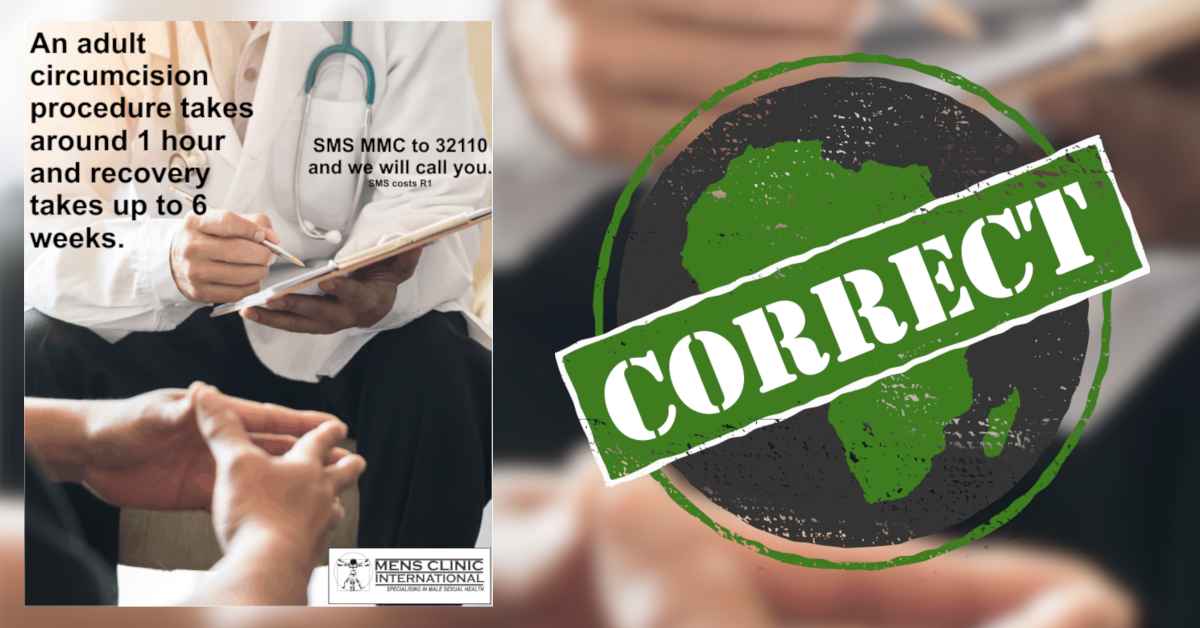“An adult circumcision procedure takes around 1 hour and recovery takes up to 6 weeks,” reads text on a graphic shared on Facebook in South Africa.
An SMS number is shown, and the Mens Clinic International logo can be seen in the bottom left corner.
The graphic has been flagged as possibly false by Facebook’s fact-checking system. Is it legit?

The World Health Organization defines male circumcision as the “surgical removal of the foreskin – the retractable fold of tissue that covers the head of the penis”.
Evidence shows that the procedure can reduce the risk of female-to-male HIV transmission by 60%, the WHO says.
The graphic is attributed to Mens Clinic International, a franchise of more than 100 male sexual health clinics across South Africa. The company lists adult male circumcision as one of the procedures it offers.
The SMS number on the graphic is the same number given on Mens Clinic International’s website.
But does recovery from adult male circumcision take up to six weeks?
The British Association of Urological Surgeons says it can take up to six weeks after the procedure “for the penis to return to its final cosmetic appearance”.
The KwaZulu-Natal department of health recommends avoiding all sexual activity for six weeks after adult circumcision.
According to the WHO, the circumcision procedure takes 20 to 30 minutes, depending on the method used. The graphic does not say whether the “procedure” is just the surgery or if it includes the consultation and administration of anaesthetic. If it’s the second, then the procedure could last an hour. – Naledi Mashishi
An SMS number is shown, and the Mens Clinic International logo can be seen in the bottom left corner.
The graphic has been flagged as possibly false by Facebook’s fact-checking system. Is it legit?

What is male circumcision?
The World Health Organization defines male circumcision as the “surgical removal of the foreskin – the retractable fold of tissue that covers the head of the penis”.
Evidence shows that the procedure can reduce the risk of female-to-male HIV transmission by 60%, the WHO says.
The graphic is attributed to Mens Clinic International, a franchise of more than 100 male sexual health clinics across South Africa. The company lists adult male circumcision as one of the procedures it offers.
The SMS number on the graphic is the same number given on Mens Clinic International’s website.
Recovery can take up to six weeks
But does recovery from adult male circumcision take up to six weeks?
The British Association of Urological Surgeons says it can take up to six weeks after the procedure “for the penis to return to its final cosmetic appearance”.
The KwaZulu-Natal department of health recommends avoiding all sexual activity for six weeks after adult circumcision.
According to the WHO, the circumcision procedure takes 20 to 30 minutes, depending on the method used. The graphic does not say whether the “procedure” is just the surgery or if it includes the consultation and administration of anaesthetic. If it’s the second, then the procedure could last an hour. – Naledi Mashishi
Republish our content for free
For publishers: what to do if your post is rated false
A fact-checker has rated your Facebook or Instagram post as “false”, “altered”, “partly false” or “missing context”. This could have serious consequences. What do you do?
Click on our guide for the steps you should follow.
Publishers guideAfrica Check teams up with Facebook
Africa Check is a partner in Meta's third-party fact-checking programme to help stop the spread of false information on social media.
The content we rate as “false” will be downgraded on Facebook and Instagram. This means fewer people will see it.
You can also help identify false information on Facebook. This guide explains how.



Add new comment